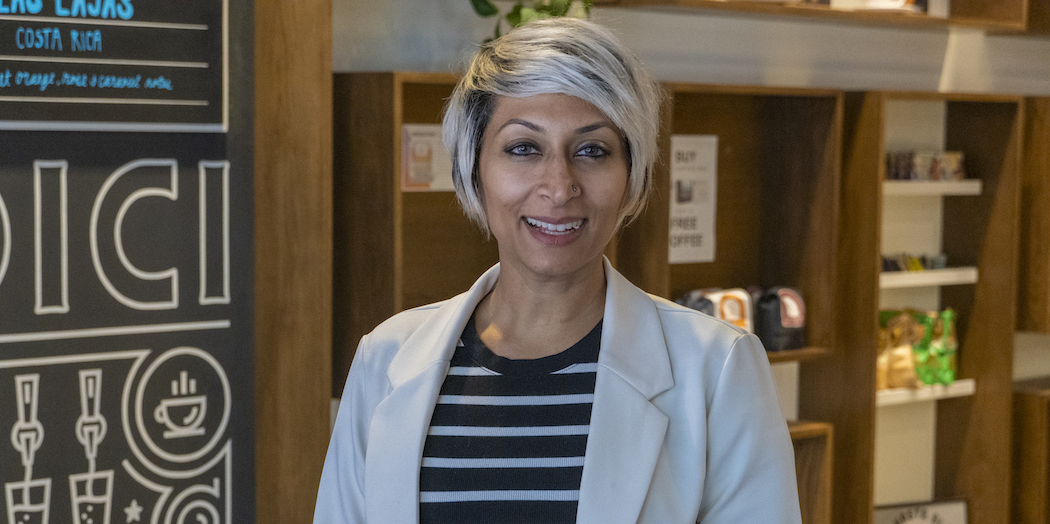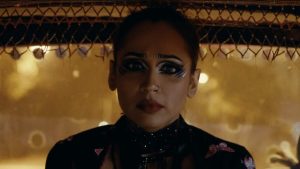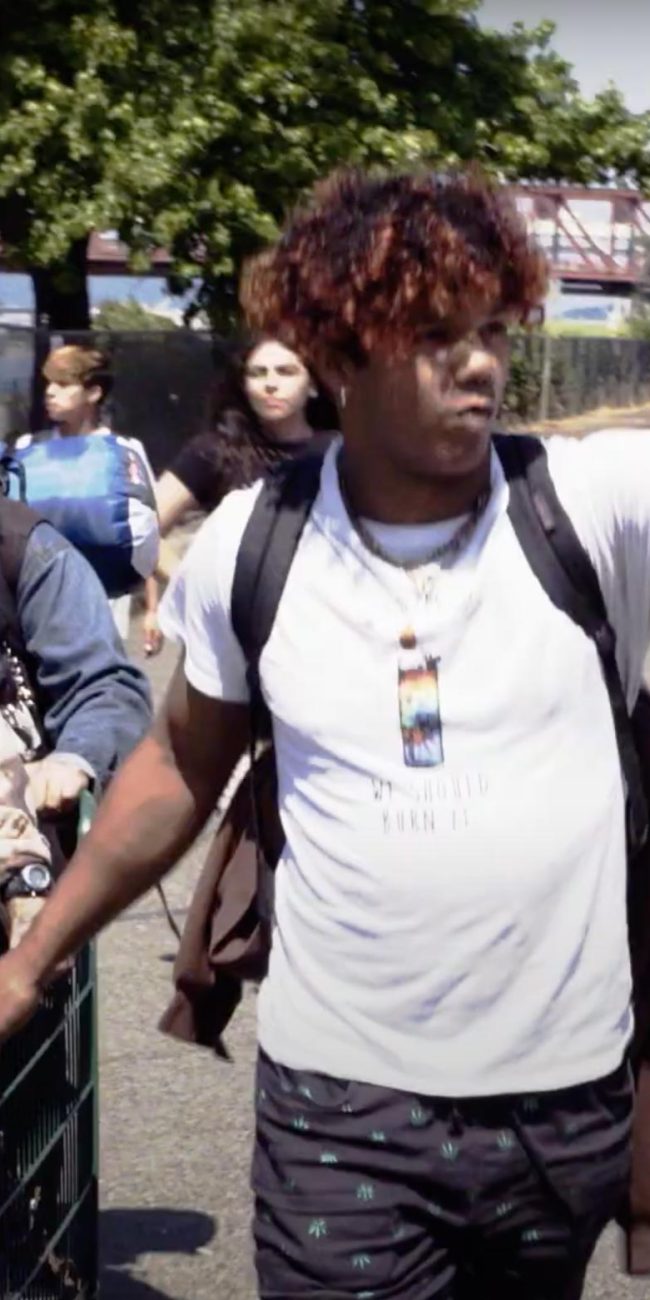A Conversation with Iram Parveen Bilal (WAKHRI)

Writer/director Iram Parveen Bilal follows up her engaging 2020 I’ll Meet You There with Wakhri, which just played SXSW 2024 (where I reviewed it). Inspired by the life of the late Pakistani social-media influencer Qandeel Baloch, this aesthetically assured and narratively powerful film follows a widowed mother, Noor (Faryal Mehmood, making her exciting feature debut) who must navigate daily microaggressions from her in-laws, step-mother, and the patriarchy around her. A teacher in a girls’ school, she struggles to raise money for a new building, and they must soon leave the current one. One day, she’s had enough, and adopts a liberated persona, “Wakhri” (which means “one of a kind” in Punjabi), and before long goes viral as she promotes feminist issues in Pakistan. Support and backlash follow. I had a chance to sit down with Bilal at SXSW, and here is a transcript of our conversation, edited for length and clarity.
Hammer to Nail: Fouzia Azeem—otherwise known as Qandeel Baloch, and the inspiration for this film—was killed in 2016. When did you get the idea to make Wakhri?
Iram Parveen Bilal: So when she was killed, I couldn’t stop thinking about her. I had only just heard of her two weeks before she was killed, and I remember just everyday refreshing my page to see if she had put up a new video. Everywhere you would go in the Pakistani community, in office cubicles, everyone would say, “Yeah, we’re just waiting for Qandeel’s video, but we don’t want our boss to see.” Because she would post these really risqué videos, and Pakistanis were scandalized but hooked.
And then one day, I’m refreshing and it says that Qandeel Baloch was killed. And what really stayed with me was that I had just heard about her. So I started peeling away the layers of what it means when a brave woman is taken down. It feels personal. Every time a brave woman is silenced in Pakistan, I’m angry. When Benazir Bhutto was gunned down, it felt personal. When Sabeen Mahmud, my activist friend, was gunned down, it felt personal. I may not have agreed with everything she said, but that’s not the point. She was unapologetic, she was brave, and she stuck out, and sure enough, they had to bring her back in line.
What I was clear about from the beginning, though, was that I didn’t want to tell Qandeel Baloch’s story, because I didn’t want to glorify an honor killing on screen. So it had to be fictionalized. And that was the beginning of it. And Abid Aziz Merchant—who’s the lead producer on the project—and I wanted to work together. We had another project that we started that didn’t work out, so I said, “What about this?” And he immediately said, “Sure! Write it.” And he supported me and I wrote it.
I then submitted it to Locarno Film Festival’s Open Doors, and our film and Joyland were the two films from Pakistan there. And we were then invited to the Cinéfondation Atelier at Cannes, but I was still making I’ll Meet You There. That was 2019, and this was supposed to be shot in 2020, but … well, you know what happened there. But in 2022, it actually worked out because we used a lot of Joyland’s crew in Pakistan. And we finished the film in August 2023, and premiered at the Red Sea International Film Festival.
HtN: How did you cast the film? Faryal Mehmood is terrific, as is Gulshan Majeed, and they’re both making their feature-film debuts. How did you find them?
IPB: So, casting directors Sana Jafri and Shehzad Ghias really helped. We knew that the person to play Noor in Wakhri had to be really unique. We also did not want to use a known face; we wanted to launch someone. Faryal is known in the TV spectrum but not in the feature spectrum. And somehow Instagram was pushing her profile to me, and I said, “Who is this person?” And Sana and I were WhatsApping and she was putting a list together for me and I then went down an Instagram rabbit hole with this actress, and then emailed Sana to ask, “What about Faryal Mehmood?” And she got back to me right away to say that she got goosebumps, because the first name she had written down in her notebook was Faryal.

HtN’s Chris Reed and filmmaker Iram Parveen Bilal
And Faryal had had an incredible weight-loss journey and was trolled. She speaks her mind and is used to this kind of trolling and hate. And that’s part of what Sana was passing on to me, that she has had to face these forces. So there was a connection.
Gulshan was also in Sana’s orbit. And actually, —Joyland’s director—mentioned him. So Sana sends me, Abid and Apoorva [Bakshi]—our other producer—a tape and we were amazed. I was in Karachi auditioning Faryal—and I’m not someone who likes to make a decision right away—and she had put such effort into her audition tape, and then when Gulshan’s tape came in, we immediately took a flight to Lahore to see him. We were in a small room and I told him to do an “item number.” Do you know what that is?
HtN: No.
IPB: It’s these super sexy songs in Bollywood that are performed like burlesque. He was so uncomfortable but still just snapped into it and gave me flair and everything, and I could just immediately see the vernacular of the body and the language. Then I came back and he was flown to Karachi and there were chemistry readings between him and somebody else. And it took a while, but once we had the two of them, we were set. And the rest of the cast includes people who are actual viral stars in Pakistan. Some are actually themselves, and others are playing others. It’s a tribute to the big viral moments in Pakistan over the past 6-7 years.
HtN: The film is beautifully shot. How did you connect with your cinematographer, Ludovica Isidori, and then what kinds of discussions did you have with her about the aesthetics?
IPB: Ludo and I have wanted to work together since 2016, and the moment I had an early draft of this film I started talking to her about it. She read very early drafts. I’m really big on homework with my DPs [Directors of Photography]. I make shot lists long before I location scout, and talk about the language of the film.
So we knew that there was an above-the-ground and below-the-ground difference in tone. We knew that her moments in the social-media spectrum had to be feel different. There’s a little bit of freedom and wanting to be out of focus from the rest of the world. So we mixed spherical and anamorphic lenses. If you look at the scenes right after her transformation, they are shot with anamorphic lenses. The moments that are supposed to feel visceral and disconnected from society are shot with anamorphic lenses, and whenever we’re above the ground in normal life, it’s spherical. Because you’re vigilant; you’re not safe enough to let go. But you are in the underground scenes. Those are safe spaces.
So there were a lot of conversations about spaces. And then since Ludo was not from Pakistan, she wanted to talk about architecture there, but though we initially discussed that, the movie became so involved in Noor and Wakhri’s story that we didn’t go that route. And also I think that can sometimes become tropey. It can just show a foreign eye with a shot that says, “Look, this is Pakistan!” So we let go of that and said, “We are not going to do that.”
There’s a lot of world-building, and I want to mention our production designer, Kanwal Khoosat.
HtN: Great! I was about to ask about the production design.
IPB: She’s from Lahore, but we shot the film in Karachi, and the amount of detail she brought to the film, from the colors for the characters to what sort of sequins to use in the costumes to the backdrop of the curtains, what sorts of things are going to be on the walls, what are the neon signs, what sorts of things are going viral now in social-media comments … just the level of detail and research was exceptional. I would be on the road or in production meetings and I would see something and say “I want this” and throw it into the WhatsApp chat, and nothing fell through the cracks; she caught everything. I would show up on set and would go, “Oh, my God! You were listening!” You can feel it in the film: the frames are so detailed.

A still from WAKHRI
And then we brought in Ludo’s charm. Ludo is a big fan of subtle lighting, natural lighting, and is very hesitant to do anything Bollywood-y. (laughs) That was the first thing she said: “Iram, I’m not shooting Bollywood. I’m not leaving my baby and coming to Pakistan to shoot Bollywood.” (laughs) And then she freaked out when she saw the beginning of the film, but I said, “No, no. It’s something different. It’s shock value. It’s underground.”
HtN: My next question is about the languages used in the film. There’s Punjabi, there’s Urdu, and then some scattered English. Who is using what language when?
IPB: As in all my films, I want to be authentic to the language. Gucchi’s character comes from a family that speaks Punjabi. Noor’s family is a little more polished, so she speaks a little more Urdu that maybe has some words of English in it. I don’t think anyone speaks only English in this.
HtN: No, it was just scattered words here and there.
IPB: Scattered, yes. That’s authentic to what Pakistan is. People speak Urdu and English, mixed. But there are a lot of people who just speak Punjabi. Like, Chaudhry speaks only Punjabi. I wanted the sort of gangster vibe to only be in Punjabi, because Punjabi has this sort of very frank, harsh tone to it. So that is why Gucchi and Chaudry pretty much exclusively speak Punjabi. But the rest of the film is mostly Urdu. And we needed to make it more Urdu and less Punjabi because we wanted to do a release in Pakistan and Urdu is the national language. Some people do not understand Punjabi.
HtN: Speaking of that release in Pakistan, you premiered the film there in January after an initial debut at Red Sea. How was the film received?
IPB: I think the film has been very positively received. It has definitely been critically acclaimed; you can see it in the reviews. But there’s also a lot of backlash and trolling, which was expected. I don’t think that anything that happened with the film has been unexpected, given that Abid and I are from Pakistan. I think what was a little shocking was the death of cinemagoing culture in Pakistan. It was so hard to get a film like this through the censor boards, which we did, but people just don’t go to cinemas anymore.
HtN: I don’t think that’s unique to Pakistan.
IPB: That is true. But it is unique in the sense that in the Indian subcontinent there has always been a big cinemagoing culture, but now that Bollywood films—for which Pakistani audiences have a great love—are cut off from Pakistan, the decline in cinema’s footfall is even worse. Because South Asia generally has a higher footfall in theaters than the Americas. It is different. Right now, India still has a pretty heavy cinemagoing culture. But it was still heartwarming to see the reception we got, especially given the ban on I’ll Meet You There. (laughs) I think Wakhri is doing a lot of therapy for I’ll Meet You There.
HtN: I didn’t realize I’ll Meet You There was banned in Pakistan. It remains banned?
IPB: Yes.
HtN: Noor, as Wakhri, asks “what’s next?” at the end of your film. So, what kinds of discussions are happening in Pakistan right now over women’s rights and LGBTQ rights?
IPB: I think that things right now in Pakistan, like the Aurat March—the Women’s March—or the Moorat March—for trans rights—are growing every year, especially after Joyland. I think there is more openness.
But also everywhere in the world right now we are seeing this two-headed monster, where it seems like we’re progressing but then there is this very insane backlash. And I think this is a global phenomenon, and I don’t think I’m equipped to analyze why that is happening, but I feel that it’s global. But in Pakistan, there is progression.
But then there was this incident where a woman was wearing calligraphy on a shirt and someone thought that it was blasphemy, and she was asked to apologize, even though the shirt said “beauty” or something like that. There’s a lot of extremism. I think the spectrum is becoming more and more extreme and the middle is disappearing. It’s a struggle, and there is still so much work to be done.
HtN: Well, thank you for making the film. I really enjoyed it.
IPB: Thank you! I appreciate it.











